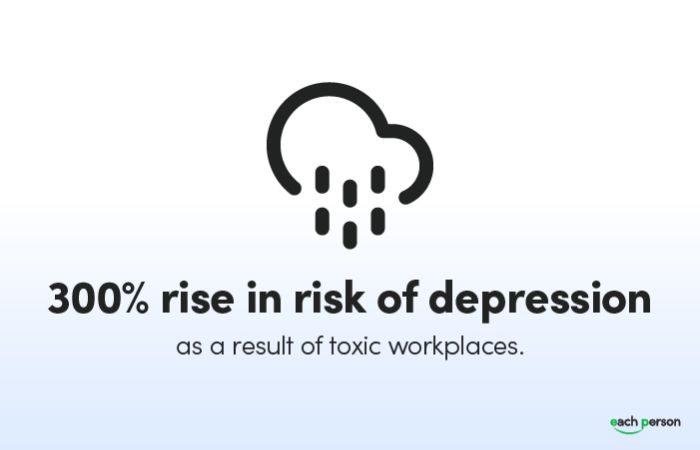
Keyword: toxic workplace
Unfortunately, toxic workplaces exist. Defining a toxic workplace can be difficult. But simply put, they are a workplace where the environment or people significantly impact your personal life. Although it is impossible to avoid all negative behaviours, if they begin to affect your people’s ability to work and wellbeing, it becomes a worry. A recent study found that toxic workplaces can increase depression by a shocking 300%. With mental health rising over the last year, companies must tackle this problem head-on.
In this article, we will be discussing some examples of a toxic workplace and how to tackle these issues.
Examples of toxic workplaces
Workplace Bully
Professor Maureen Dollard, a researcher into work stress and Organisational Psychology, says, “bullying in a work unit can not only negatively affect the victim, but also the perpetrator and team members who witness that behaviour. It is not uncommon for everyone in the same unit to experience burnout as a result.”
Lack of proper rewards and recognition
Rewards and recognition are popular within many forward-thinking companies. However, just because they are in place does not mean that they are effective. Dr Amy Zadow states, “companies who fail to reward or acknowledge their employees for hard work, impose unreasonable demands on workers, and do not give them autonomy, are placing their staff at a much greater risk of depression”.
How to change toxic workplaces
Improve communication
Having better communication systems can make it easier and more transparent for your people to talk about these toxic workplace environments. Therefore, without sufficient means of communication, they can fall behind or feel unable to address problems.
Set up precise ways for individuals to come to you for help and make them aware you can offer guidance and listen.
Take a stand
If you see bullying or gossip at work, address these issues. The more individuals take a stand. The less likely these incidents are going to take effect.
Bring in effective rewards and recognition.
Creating a positive workplace culture will begin to diminish any toxic workplace environment. Team members who feel valued are less likely to project insecurities and create unhelpful competition. Consequently, saying thank you for your hard work can be a simple way to achieve this.
All in all, toxic workplaces can sometimes be hard to avoid. However, implementing the correct foundations to allow for positive environments to thrive will undoubtedly make a real difference to mental wellbeing.
To discover how Each Person can help improve your workplace environment through perks at work, contact us at [email protected]. Also, follow us on social media today to stay up to date with tips for the workplace and beyond!
Follow us on Twitter: @_EachPerson
Follow us on Linkedin: Each Person